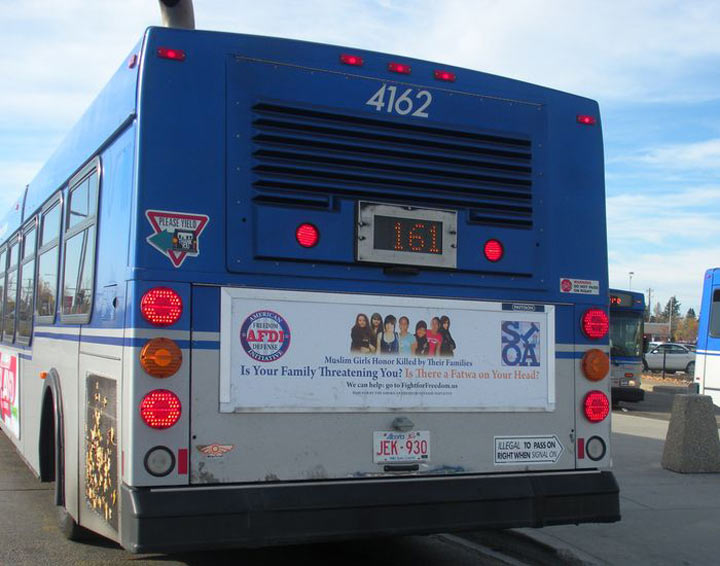TORONTO – When Edmonton Transit rolled out bus ads reading “Muslim Girls Honor Killed By Their Families,” asking “Is your family threatening you? Is there a fatwa on your head?” it caused complaints of discrimination and racism that resulted in their removal.

Now—nine months later—the New York-based non-profit organization that paid for the transit ads is suing the city, claiming the removal violates freedom of expression.
“The City of Edmonton has silenced the voice of a non-profit group that wants to assist Canadian women and girls, protect them from honour killings, and promote gender equality,” said lawyer John Carpay, president of the Justice Centre for Constitutional Freedoms (JCCF) in a release.
The JCCF is representing the American Freedom Defence Initiative (AFDI), the group that paid for the advertisements. The images showed Canadian and American girls, including 16-year-old Ontario resident Aqsa Parvez, who was strangled by her father and brother after rejecting cultural traditions of her family and an arranged marriage.
Commuters were advised to visit FightforFreedom.us to get “help,” as listed on the ads. AFDI’s Pamela Geller said that help could come in the form of access to a support system of former Muslims or Muslims who’ve experienced the same problems, or access to a safe house.
“The Muslim community protects the idea of honour in Islam while smearing and libeling as racist the few truth-tellers that come to the aid of these girls,” said Geller. She gave one reason for her belief in a strong case against the city’s removal:
“Because I don’t believe that helping Muslim girls is racist.”
A city spokesperson said it wouldn’t be appropriate to comment on a case that will be before the courts, but explained the reasons for removing the ad.
Edmonton Transit vehicle advertising must meet Advertising Standards of Canada requirements, which contains 14 clauses on criteria for “advertising that is truthful, fair and accurate,” wrote Cheryl Oxford.
“The complaints the City received about the ads related to a breach in these clauses (in particular negatively singling out one particular religious group) and therefore warranted the removal of the ads.”
City councillor Amarjeet Sohi contacted Edmonton Transit after receiving complaints through social media and calls to his office last October. Sohi said Monday the ads unfairly portrayed domestic violence as a problem pertaining only to Muslim communities, and suggested many domestic violence cases have nothing to do with religion.
“What [the ads] did was divide the community based on religion and culture.”
In response to criticisms of discrimination against the Muslim community, Geller said “over 90 per cent of honour killings worldwide are Islamic.”
She said the ads were only up in Edmonton for between 24 and 48 hours last October, but hopes to expand the ad campaign after the court case.
“When we experienced this, we felt that we should fight it, win, then move forward with a national campaign to help girls in endangered situations,” she said. “I’d like people to see it; I’d like people to make up their own minds.”
The case will be heard Feb. 20, 2015 by the Alberta Court of Queen’s Bench.



Comments